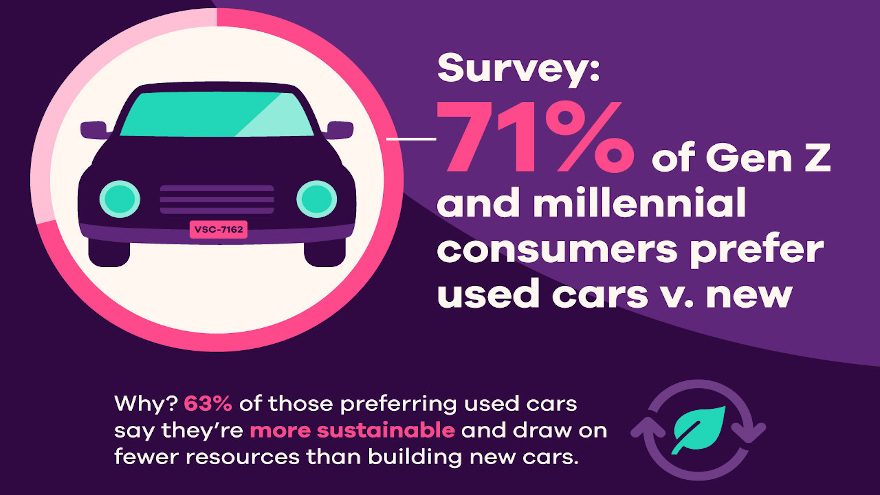Ally survey reinforces appeal of used vehicles by younger buyers

Graphic courtesy of Ally Financial.
By subscribing, you agree to receive communications from Auto Remarketing and our partners in accordance with our Privacy Policy. We may share your information with select partners and sponsors who may contact you about their products and services. You may unsubscribe at any time.
From vintage clothing to retro furniture finds, Ally Financial said that thrifting is the shopping mode of choice for many Gen Z and millennial consumers as they look for ways to lessen their impact on the environment.
According to a new survey orchestrated by the finance company, the same approach now holds true for vehicle buying.
In a survey of 2,000 American adults conducted by One Poll on behalf of Ally Financial, 71% of consumers ages 18 to 40 say they would rather buy a used vehicle than a new one, even as used-vehicle prices hit record highs.
For this age group, Ally discovered sustainability is a key motivator with 63% of used-vehicle shoppers stating they would prefer a used vehicle specifically because it’s more sustainable and draws on fewer resources than building new models.
“Sustainability has become a key priority for Gen Z and millennial consumers, and it’s impacting the way they think about cars and their car-buying decisions,” said Doug Timmerman, president of dealer financial services at Ally Financial.
“Whether it be through purchasing an electric vehicle, or a used car, the goal remains the same: to lessen environmental impact,” Timmerman continued in a news release.
Subscribe to Auto Remarketing to stay informed and stay ahead.
By subscribing, you agree to receive communications from Auto Remarketing and our partners in accordance with our Privacy Policy. We may share your information with select partners and sponsors who may contact you about their products and services. You may unsubscribe at any time.
Ally’s survey indicated 82% of consumers ages 18 to 40 agree that electric vehicle are the future, with 72% saying they’d consider purchasing an electrified vehicle, compared to only 28% of drivers ages 57 and older.
However, Ally discovered cost is still a consideration as nearly half (45%) of Gen Z and millennial consumers said cost could hinder their EV purchase.
With used vehicles and electric vehicles gaining in popularity as sustainable options, Ally said consumers recognize any vehicle choice brings additional expenses. To keep expenses under control in uncertain times, 81% of younger consumers indicate they are more inclined to purchase a vehicle service contract (VSC) due to the pandemic.
“There’s a common misconception that electric vehicles have minimal service and repair needs, but that’s not necessarily the case,” Timmerman said.
“Whether consumers are purchasing EVs or used cars in an effort to be sustainable, vehicle service contracts can provide peace of mind for unexpected repair expenses and help extend the life of the vehicle,” he went on to say.
Ally reiterated that VSCs can help cover expenses such as repairs and replacement parts that fall outside the factory warranty including costly high-tech features such as LCD screens, lane departure warning systems, adaptive cruise control and more.
As an example, Ally Premier Protection VSCs cover more than 7,500 vehicle components and offer other benefits, such as alternate transportation (including ride sharing), roadside assistance and reimbursement for trip interruption caused by a breakdown.
Ally said levels of coverage vary by plan and are available for new and used vehicles.


